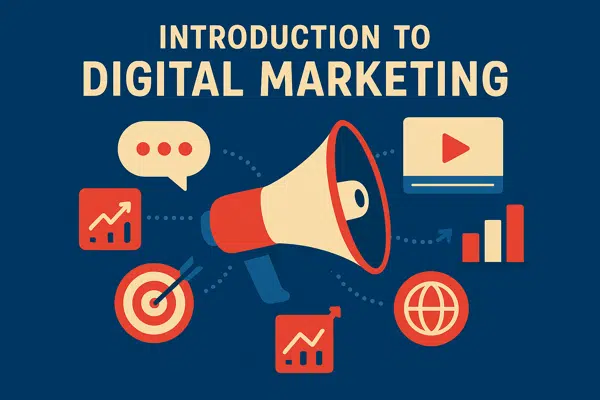Introduction to Digital Marketing
Digital marketing has become one of the essential components in modern business strategies, as it revolves around marketing products and services through the internet. This type of marketing includes a wide range of activities such as social media advertising, search engine optimization (SEO), and email marketing. Its primary focus is to reach a broader audience and build long-term relationships with customers.
The importance of digital marketing grows day by day, especially in an era dominated by technology and information. Companies that prioritize their digital presence and invest in digital marketing enjoy a competitive edge, as they can interact instantly with customers and attract targeted audiences more precisely.

With current trends evolving, companies are adopting innovative marketing strategies using digital analytics tools to understand audience behavior and tailor campaigns accordingly. For instance, they may employ content marketing techniques that aim to provide valuable information to audiences, increasing brand awareness and trust.
Today, digital marketing is no longer optional for companies that seek success in the marketplace. It not only provides a platform to promote products but also enhances a company’s ability to study and analyze customer feedback, enabling the development of more effective long-term strategies. Therefore, understanding digital marketing and integrating it into the overall business strategy has become one of the most effective approaches in the digital era.
Types of Digital Marketing
Digital marketing encompasses a set of strategies aimed at enhancing brand presence and increasing sales through digital media. Among the main types of digital marketing is social media marketing, which involves using platforms like Facebook, Twitter, and Instagram to engage directly with audiences. This method is effective for building customer relationships and brand awareness. However, companies may face challenges such as algorithm changes and market saturation.
Another type is email marketing, which involves sending promotional messages directly to users’ inboxes. These messages can include updates, offers, or educational content. This strategy is effective in attracting potential customers and achieving repeat sales. However, maintaining an active and high-quality email list and avoiding spam are critical challenges.
Search Engine Optimization (SEO) is also a vital tool for improving website visibility on search engines like Google. It involves enhancing content quality and applying specific techniques to increase organic traffic. The main challenges here include the constant evolution of search engine algorithms and intense competition among websites.
Lastly, Pay-Per-Click (PPC) advertising allows companies to pay for their ads to appear in search engines and social media platforms. This method provides quick access to target audiences but requires ongoing financial investment and can be costly if not managed correctly.
The Importance of Building a Brand Identity Online
Building an online brand identity is a crucial factor for success in digital marketing. A strong identity can increase brand recognition and foster trust among customers. In an increasingly competitive environment, it is essential for companies to create an identity that reflects their core values and principles, making it easier for consumers to connect with and make purchasing decisions based on this familiarity.
When building a brand identity, companies should consider several key elements. Among the most important are visual design components such as logos, colors, and font styles. These elements directly influence audience perception and help create an emotional connection. Additionally, brand identity includes the marketing message and the tone used when communicating across various digital platforms.
Many companies have successfully established strong online identities. For example, Apple is globally renowned for its identity centered on innovation and excellence. Apple consistently uses the same visual elements and tone in its communication, yielding positive brand loyalty. Similarly, Nivea has built a trustworthy and caring identity, making it a leader in the skincare industry.
Ultimately, building a strong brand identity online is a necessary investment for any company aiming to succeed in digital marketing. A brand’s identity reflects its mission and helps create lasting relationships with customers, contributing to higher future returns.
Effective Digital Marketing Strategies
Digital marketing is a critical success factor in the digital age. To achieve desired results, businesses must adopt effective marketing strategies that enhance their online presence and attract target audiences. One such strategy is content personalization. By understanding customers’ needs and opinions, stakeholders can create content that aligns with their expectations, increasing engagement and conversion rates.
To further enhance digital marketing strategies, data analytics plays a central role. Analyzing data helps understand consumer behavior, enabling brands to make informed decisions regarding marketing campaigns. Tools like Google Analytics offer valuable insights into how visitors interact with content and websites.
Moreover, social media serves as an ideal platform for promoting brands. By applying best practices—such as targeting the right audience and using visual content—companies can improve their strategies across these channels. Businesses must also focus on engaging with their audience and responding promptly to inquiries and feedback, fostering a supportive environment and greater brand loyalty.
By applying the appropriate strategies, marketers can boost campaign effectiveness, forming the foundation of successful operations in an ever-changing digital environment. Understanding and correctly implementing these strategies can significantly contribute to long-term success in digital markets.
Digital Marketing Tools
Digital marketing tools are a fundamental part of any successful marketing strategy. These tools provide the technologies needed to analyze performance, manage campaigns, and increase audience engagement. Among them, analytics tools, campaign management platforms, and SEO tools are central to any effective marketing plan.
Analytics tools such as Google Analytics and HubSpot are essential for understanding user behavior on websites. These tools allow marketers to track visits, conversion rates, and traffic sources. By analyzing this data, businesses can make informed decisions about improving campaigns and increasing ROI.
Campaign management platforms like Mailchimp and Hootsuite offer integrated environments for managing all aspects of marketing campaigns. These platforms provide features such as scheduling social media posts, managing email lists, and centralized performance tracking. Using these tools simplifies processes and enhances coordination among different teams.
When it comes to SEO, tools like SEMrush and Ahrefs are indispensable for improving search engine visibility. They help with keyword research, competitor analysis, and tracking page rankings. SEO tools enable a better understanding of market trends and customer needs.
In short, digital marketing tools enhance efficiency and performance. Using the right tools can lead to better results and increased engagement with the target audience. Companies should invest in these tools to ensure their marketing strategies succeed.
Measuring Performance in Digital Marketing
Measuring performance is a vital component of any digital marketing strategy aimed at delivering effective results. While various metrics exist, key performance indicators (KPIs) are fundamental tools for evaluating the success of online campaigns and marketing efforts. One of the most important KPIs is the conversion rate, which measures the percentage of visitors who take a specific action, such as making a purchase or signing up. A high conversion rate indicates effective strategies.
Additionally, traffic is a crucial metric that should be monitored regularly. Knowing the number of visits to a website reflects the level of audience interest in the content. In this context, it is important to consider the source of traffic, which helps assess the effectiveness of channels like search engines, social media, and email marketing. Analyzing traffic sources enables the refinement of existing strategies and the optimization of future campaigns.
Return on investment (ROI) is another vital performance metric in digital marketing. It allows marketers to understand how efficiently their budget is being spent and what returns are generated. ROI can be calculated using the simple formula: (Revenue – Costs) / Costs. This metric guides financial and marketing decisions. By using these indicators, marketing entities can refine and personalize their strategies to achieve sustainable success in the ever-evolving online landscape.
Challenges Facing Digital Marketing
Digital marketing is a crucial tool for companies in the digital age, but it comes with numerous challenges. One major challenge is the constant change in search engine algorithms. Companies like Google regularly update their algorithms, which affects how content appears in search results. Marketers must stay up-to-date with these changes and adapt quickly to maintain their websites’ visibility.
Another key challenge is the intense competition in the digital space. As more brands adopt digital marketing, it becomes harder to distinguish one brand from another. This requires innovative and unique marketing strategies based on a deep understanding of the market and the target audience. Positive customer interaction and valuable content are essential to stand out in this competitive environment.
Furthermore, rapid technological advancement presents another challenge. With the continuous development of mobile devices and social media applications, marketers must adapt to new platforms and tools. Companies must invest in training and education to ensure their marketing teams can effectively use these tools. Moreover, balancing technology use with personal interaction is crucial, as meeting evolving customer needs is more important than ever.
By understanding these challenges, marketers can develop effective strategies to overcome them, enabling success in the ever-changing digital marketing landscape.
Successful Examples of Digital Marketing
In the current digital age, many businesses have achieved significant success by adopting digital marketing strategies. One prominent example is Nestlé, which effectively used social media to boost brand awareness and promote its products. Through well-planned promotional campaigns on platforms like Facebook and Instagram, Nestlé engaged directly with consumers, helping the company better understand customer preferences. This strategy effectively improved the brand’s image and increased sales.
Another example is Amazon, a leader in e-commerce. Amazon leverages big data to analyze customer behavior and personalize promotional offers. By tailoring content and providing a personalized shopping experience, Amazon has made online shopping more appealing and convenient, enhancing customer loyalty and significantly increasing sales.
Similarly, Zara is a successful example of digital marketing. Zara’s ability to quickly update its collections based on current trends and consumer preferences sets it apart. The company uses its website and mobile apps to frequently introduce new product lines, encouraging customers to return regularly to explore new items. These strategies have proven effective in boosting sales and customer satisfaction.
These examples highlight how companies can effectively leverage digital marketing. By analyzing and learning from these experiences, others can adopt and apply similar strategies to enhance their own marketing efforts.
The Future of Digital Marketing
Digital marketing is a constantly evolving field, with new technologies emerging regularly, shaping how companies interact with their audiences. One of the most prominent future trends is artificial intelligence (AI). By using AI, companies can analyze customer data more accurately, allowing for the development of personalized marketing strategies that better meet consumer needs. AI also enhances the customer experience by providing tailored recommendations and improving customer service.
Augmented reality (AR) is another influential trend in digital marketing. AR applications help create unique interactive experiences for users, making products more engaging and relevant. For example, customers can use AR technologies to try products before purchasing, enhancing decision-making and reducing returns.
Additionally, influencer marketing is playing an increasingly important role. Collaborating with social media influencers is an effective way to reach a wide audience. The reliance on influencer marketing is expected to grow, as partnerships with influencers can convey marketing messages more credibly and effectively. As these trends continue to evolve, companies must adapt and seize the new opportunities they present. Continuous innovation and responsiveness to changing digital marketing patterns are fundamental to future success.








Direct marketing is all about clarity and action — love how it cuts through the noise and speaks straight to the customer!
So inspiring! Application developers blend logic and creativity to build tools that power everything from business to entertainment
This reflects a well-rounded marketing mindset — mastering both paid and organic approaches unlocks long-term success.